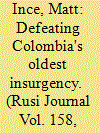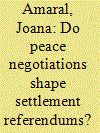| Srl | Item |
| 1 |
ID:
122229


|
|
|
|
|
| Publication |
2013.
|
| Summary/Abstract |
The decision to enter into peace negotiations with the FARC represents the latest in a series of attempts by Colombia's Santos administration to prioritise political over military activities in seeking an end to the country's internal conflict. Yet despite favourable political conditions, a number of major challenges remain which could prevent a meaningful peace settlement from coming to fruition. Matt Ince argues that the single largest obstacle in this regard is the potential for the talks to cause fragmentation within the FARC, an outcome that could impede its leaders in negotiating a settlement viewed as legitimate by the entire organisation, while opening the door to the emergence of FARC splinter groups in the period ahead.
|
|
|
|
|
|
|
|
|
|
|
|
|
|
|
|
| 2 |
ID:
160810


|
|
|
|
|
| Summary/Abstract |
Peace negotiations have traditionally aimed at reaching a negotiated settlement between political representatives in conflict settings. However, these settlements have seldom been rejected in referendums. This article uncovers whether the way peace negotiations are conducted influences peace settlement referendum outcomes in order to determine if and how they can better foster public support for peace settlements. It analyses and compares if and how specific characteristics of the Annan Plan and the Good Friday Agreement negotiations influenced the rejection of the former in 2004, and the acceptance of the latter in 1998, in their respective referendums in Cyprus and Northern Ireland. Through the qualitative analysis of elite interviews and documental data, it demonstrates that political inclusivity, civil society engagement and the public exposure of the negotiations shaped the opposing outcomes of the two cases, as well as differences in the support given by the local communities. It argues that peace settlement referendums require less secretive and more inclusive negotiation processes, which can better foster political support and civic mobilisation, and inform and engage the wider communities at earlier stages of the peace process.
|
|
|
|
|
|
|
|
|
|
|
|
|
|
|
|